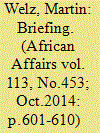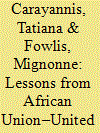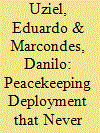| Srl | Item |
| 1 |
ID:
134351


|
|
|
|
|
| Summary/Abstract |
ACADEMIC ANALYSES OF THE PROLONGED CRISIS in the Central African Republic (CAR) and the international response to it are rare. This masks the depth of the crisis. The most recent outbreak of conflict alone, following a coup d'état staged by the Séléka rebels in March 2013, left countless civilians dead,1 more than half a million people displaced, and over half of the 4.6 million population in immediate need of aid.2 Several regional and international organizations, including the African Union (AU), the Economic Community of Central African States (ECCAS), the European Union (EU), and the United Nations (UN), became involved in the process of crisis solution, with all of the organizations deploying troops to the CAR. Their efforts have thus far born limited results; fighting and human suffering continue.
|
|
|
|
|
|
|
|
|
|
|
|
|
|
|
|
| 2 |
ID:
154381


|
|
|
|
|
| Summary/Abstract |
Having hosted nearly a dozen peacekeeping and peacebuilding efforts since the mid-1990s, the Central African Republic (CAR) has been a laboratory for peace interventions – an ‘early adopter’ of various peace initiatives. It is thus a useful case from which to draw preliminary conclusions about the roles of the United Nations (UN) and regional organisations in resolving conflicts that involve entire regions. This article examines the roles of the UN and the African Union (AU) in CAR, where there is a long history of successive conflict resolution efforts that have been overseen by the international community and the region alternatively. The AU, regional economic communities (RECs) such as the Economic Community of Central African States (ECCAS), and regional leaders have also played important roles during the many initiatives aimed at resolving conflict in CAR. This article analyses the responses and relationship between these institutions and actors, beginning with the deployment of an inter-African monitoring mission in 1997. It is argued that peace operations in CAR have lacked a clear political strategy and a clear understanding of the situation, as well as the necessary sustained engagement from both regional and international actors. It is further argued that each subsequent intervention has added an additional layer to the previous one, thus creating a proliferation of peace operations whose mandates, troop contingents and leadership have not always been fit for purpose.
|
|
|
|
|
|
|
|
|
|
|
|
|
|
|
|
| 3 |
ID:
181420


|
|
|
|
|
| Summary/Abstract |
The article aims at investigating how do mechanisms of bureaucratic politics contribute to the decision of deploying troops and in so doing to mold the national motivations underscoring the deployment. The text takes Brazil as a case and researches the decision-making process in the country, using past cases of deployments that actually happened. The bulk of the analysis, however, is dedicated to the negative case where Brazil decided not to contribute to the United Nations Multidimensional Integrated Stabilization Mission in the Central African Republic (MINUSCA). The analysis provides a breakdown of the 2017–2018 domestic political and bureaucratic decision-making process in Brazil as regards the possibility of deploying troops to MINUSCA and traces the mechanisms in action that resulted in the negative decision by the government. Based on the case of Brazil, considerations are made on the importance of investigating negative scenarios to better understanding how developing countries, such as the BRICS, value the motivations and ultimately decide to contribute to a UN mission.
|
|
|
|
|
|
|
|
|
|
|
|
|
|
|
|